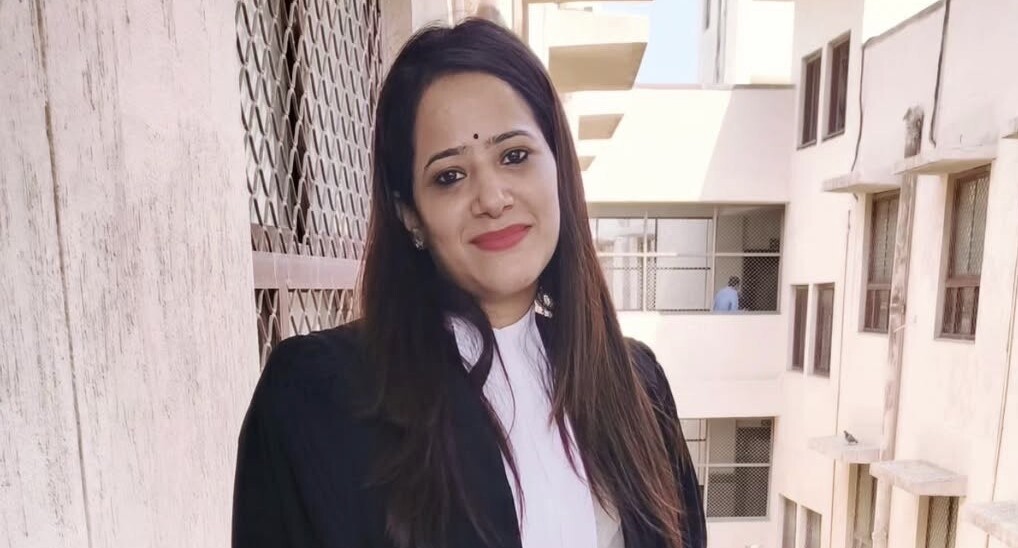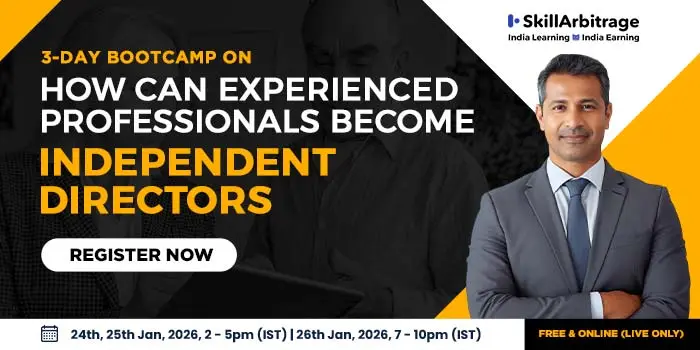This interview has been published by Anshi Mudgal and The SuperLawyer Team
You began your academic journey with a background in commerce and CS before pursuing your LL.B. What inspired this transition, and how did your early education shape your understanding of law?
Honestly, law wasn’t something I had planned from the beginning. I was sitting with my mother one day, completely confused about what to do next. I told her I wasn’t really interested in commerce, and she laughed and said, “Hamare ghar mein koi lawyer nahi hai, aur tumhara toh waise bhi ladai-jhagde ka dimag chalta hai, law kar lo.” It was said jokingly, but somehow it stayed with me. The very next thing I knew, I had taken admission in Madhusudan Law College.
Once I started studying law, I realised how naturally it connected with the way I think, questioning, reasoning, and standing up for what feels right. My commerce and CS background gave me a habit of thinking logically and paying attention to detail, which later helped a lot in legal drafting and understanding case records. Looking back, that light-hearted moment with my mother actually became the turning point of my life.
During your initial years of college and early practice, what key lessons or experiences prepared you for active litigation? Was pursuing litigation something you had always envisioned for yourself?
To be very honest, during college I was never one of those overly serious law students. I used to bunk classes quite often and sit under the neem tree with friends. I was very active in co-curricular activities- debates, events, organizing functions, but attending regular lectures was never really my thing. At that time, I hadn’t even imagined that I would actually take up litigation one day.
Things changed when I moved to Jodhpur in 2016. In 2018, I joined the trial court, and honestly, it was a tough beginning. I had no friends here, no contacts, and I didn’t know how I was going to find my place in a completely new professional circle. Those initial months: almost eight to nine, were all about learning by observing and surviving through small but meaningful experiences.
Later, I shifted to the High Court, and that’s when I realised that maybe this was exactly where I was meant to be. Looking back now, I feel choosing litigation was one of the best decisions I’ve made. It challenged me, shaped me, and made me value the strength that comes from starting all over again in a new city, purely on your own effort.
You have been practicing at the Rajasthan High Court across diverse areas such as commercial law, property disputes, arbitration, and criminal matters. How did you build versatility across these domains and manage all matters effectively?
Over time, I’ve handled a variety of matters, from commercial and property disputes to arbitration and criminal cases, but if I’m being honest, criminal litigation is my real zone. It naturally suits my personality. I’ve always been someone who believes in standing firm, not getting intimidated, and saying things as they are. That fearless side of me connected very well with the criminal side of practice.
In criminal law, you learn to read people, their behaviour, mindset, and what drives them. Understanding how a criminal thinks or reacts is not just about law; it’s about human psychology, and that’s what makes it so fascinating. It gives you a different kind of edge and maturity as a lawyer.
For female lawyers especially, criminal litigation adds a certain strength to your personality, it teaches you how to hold your ground in tough spaces. Over time, I’ve realised that while I enjoy working across different branches of law, criminal litigation brings out the most fearless and analytical version of me.
You have also been actively contributing as a pro bono lawyer. What motivates your involvement in public service, and how have these experiences shaped your understanding of access to justice?
I’ve always felt that the purpose of being a lawyer shouldn’t just be limited to luxury litigation or earning money. Somewhere, we tend to forget that the law was made for people who actually need its protection the most. Around my own neighbourhood, I’ve seen so many individuals who quietly suffer because they don’t even know their rights, they simply don’t have the awareness or resources to seek help.
That’s why I take my legal aid work very seriously. The Legal Services Authority often appoints me in such cases, and I consider it both a duty and an honour. One case that really stayed with me was an MTP (Medical Termination of Pregnancy) matter involving a minor rape victim from a very difficult background. She was completely unaware of the legal process, and time was crucial. Managing that case made me realise how powerful our profession can be when used with empathy and urgency.
At the end of the day, I truly believe that we become lawyers in the real sense only when we stand beside those who genuinely need us. The real purpose of this profession lies in restoring someone’s faith in the law. When people see that justice can actually protect them, their trust in the system grows stronger, and that trust, once earned, is the most meaningful reward a lawyer can ever receive.
As a panel advocate for the Rajasthan State Legal Services Authority, what has been one of the most challenging cases you’ve handled, and how did you navigate it?
Every legal aid matter has its own challenges, but one case that I will never forget was before a Division Bench. I was representing the respondent father in a matter involving a 9-month-old baby who had been given in adoption without informing the natural mother.
Even though I was appearing for the respondent, the case affected me deeply. When the court finally directed that the baby be handed back to the natural mother, the entire courtroom turned emotional. On one side stood the mother who had given birth, and on the other, the woman who had cared for the baby and nurtured her for months. Watching both of them break down was heart-wrenching.
That day reminded me that law isn’t always about right or wrong, sometimes it stands between two truths, two emotions, and two lives. Even the Hon’ble Bench remarked that while everyone felt the pain, law is law. That moment taught me that as lawyers, we must carry empathy with firmness, to feel the human side of justice while still upholding the legal one.
Alongside your legal practice, you have written articles for reputed publications on issues such as gender equity and the experiences of women in law. What inspired you to explore these themes, and how do you see the role of women evolving within the legal profession?
Whatever I’ve written so far has come from what I’ve actually seen and felt inside courtrooms, not from theory, but from daily experiences. I’ve seen how small things, which often go unnoticed, slowly create barriers for women in this profession. Everyone talks about gender equity, but very few actually address the uncomfortable truths behind it.
Through my writing, I’ve tried to reflect what many women advocates silently feel but don’t say out loud. These are thoughts that belong to all of us, I’ve just tried to put them into words. Because if we don’t speak, how will anyone know where the problem truly lies?
Yes, things are changing, but the pace is slow. Still, I genuinely believe that women are no longer just part of the legal system, we’re shaping it, questioning it, and giving it new meaning. And if my articles can make even one person pause and think about these realities, I feel I’ve done something worthwhile as both a lawyer and a writer.
You have represented clients before multiple forums, including the Rajasthan High Court, Commissions, and Tribunals, and have also appeared in various Public Interest Litigations. What is your perspective on the evolving scope of PILs and their significance for the legal community?
Public Interest Litigation, in its true sense, is a beautiful concept, it allows the court to hear those who otherwise have no voice. I’ve been fortunate to work as amicus curiae in matters like the Nari Niketan case and the suo motu matter related to stray animals, both of which dealt with genuine issues that directly impacted public welfare. These cases made me realise how meaningful PILs can be when handled with sincerity, they push real change, bring accountability, and ensure that the law reaches beyond individuals to society at large.
But the truth is, over time, I’ve also seen how this concept is being diluted. Many people now file PILs without proper groundwork or genuine cause, just to gain attention or to keep their names in circulation. Because of such misuse, even genuine petitions sometimes don’t get the seriousness they deserve. That’s the sad part: when the noise of the unnecessary hides the voice of the necessary.
As lawyers, we carry a responsibility to preserve the sanctity of PILs. If we treat it with respect and care, it can remain one of the strongest instruments of justice in our system. For me, being appointed amicus and working on causes that truly matter has been both humbling and grounding, it reminds me that law is at its best when it serves humanity, not headlines.
With experience spanning civil, criminal, and commercial practice, what moments have most shaped your perspective toward the practice of law?
When I look back, I feel even small incidents can shape your entire perspective as a lawyer. I still remember one moment from my early days in practice. Had just joined my senior’s office, and one day, my matter was listed before a Division Bench. I requested an adjournment because I didn’t have the file, the staff had taken it, assuming it wouldn’t be listed.
But the court refused and said, “No adjournment. Madam Borana, how long will you keep asking for adjournments?” For a second, I went blank. I said, “My Lords, I have no instructions to argue.” The Bench replied, “We’ll give you the file, you argue.”
That moment hit me hard. I gathered courage and said, “My Lords, it’s not that I don’t argue, I just never got the opportunity in your court. You may ask me any facts from the file, and I’ll answer.” That one push changed everything. Later, I realised the judges weren’t being harsh, they were motivating me. And interestingly, the same judge today appreciates my work the most.
That incident boosted my confidence and reminded me that sometimes the courtroom itself becomes your best teacher. Every tough moment, every unexpected challenge, they all prepare you quietly for what’s next.
What core principles have guided you throughout your career, and what advice would you offer to young lawyers aspiring to build an independent practice in the High Courts?
This profession tests you in every possible way, emotionally, mentally, and even morally. What has always guided me through it all are three simple principles: honesty, preparation, and patience.
Honesty, because in the end, the court can always sense your intent.
Preparation because confidence in the courtroom doesn’t come from personality alone; it comes from the hard work you put in behind the scenes.
And patience because growth in litigation doesn’t happen overnight. You have to show up every single day, learn, observe, and keep your calm even when things move slowly.
My advice to young lawyers is simple, don’t wait for confidence; build it through preparation and persistence. Read your files as if they’re your responsibility, not just your assignment. Respect the court, stay consistent, and never let rejections shake your foundation.
As for myself, I wish to continue strengthening my independent practice and focus on matters that hold both legal and human value. Law, for me, is not about fame or success, it’s about ensuring that justice is not just delivered but also felt.
Get in touch with Priyanka Borana –





Test